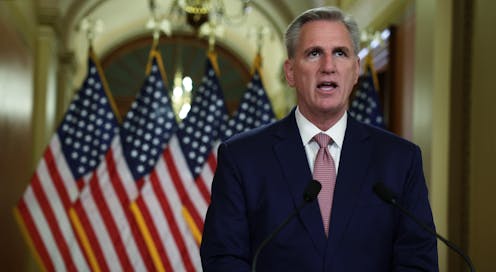Medicaid work requirements would leave more low-income people without health insurance – but this po
Adults insured by Medicaid who are 19 to 55 years old and don’t have children or other dependents would need to spend 80 hours a month doing paid work, job training or community service.

The legislative package the U.S. House of Representatives passed on April 26, 2023, by a narrow margin would pare federal spending over the next decade while also raising the debt ceiling. One important measure in the Republican-backed bill would restrict access to Medicaid for millions of Americans.
About 1 in 4 Americans have health coverage through the program, which primarily serves low-income and disabled people and which is funded jointly by the federal government and the states. Should the Republican-backed legislation prevail, the federal government would require adults insured by Medicaid who are 19 to 55 years old and don’t have children or other dependents to spend 80 hours a month doing paid work, job training or community service.
The Conversation asked Simon F. Haeder, a public health scholar, to explain what the proposed work requirements would do and why the Republican effort to institute them matters for the millions of Americans who rely on Medicaid.
What would change if this policy took effect?
Unlike some other government programs that assist low-income Americans, including the Supplemental Nutrition Assistance Program, or SNAP, and Temporary Assistance for Needy Families, Medicaid currently has no work requirements.
The package the House recently passed would require all states to implement this policy. An estimated 15 million Americans with Medicaid would need to comply with the requirements.
This change would dramatically increase bureaucratic hassles for Medicaid beneficiaries who are disproportionately low-income, disabled and nonwhite. KFF, a health care research nonprofit, estimates that 1.7 million people would lose federal coverage. However, states have the option to continue to pay for these individuals solely with state funds.
Those who would be subject to the new rules would not be the only ones at risk. It is well known that many of the exempt populations, including the aged and disabled, struggle to complete paperwork or fail to understand complex bureaucratic rules. Many experts predict that coverage losses could be even higher among these demographics, as states would consider them to be out of compliance with work requirements.
Are there precedents for this policy?
This is not the first time that Republicans sought to make access to Medicaid contingent on meeting work requirements for at least some beneficiaries. The Trump administration worked with various Republican-led states to use what are known as 1115 demonstration waivers for that purpose. These waivers allow states to make temporary changes to their Medicaid programs that depart from certain statutory requirements. However, those efforts were quickly blocked in court. Most were never even piloted before the Biden administration rescinded them.
One exception is Arkansas.
Arkansas began imposing work requirements on Medicaid recipients on adults ages 30 to 49 starting in June 2018. As a result, about 1 in 4 Arkansans subject to that policy ended up losing their coverage by the end of that year before courts deemed it unlawful.
The Arkansas experience, which was particularly burdensome for beneficiaries, reaffirmed many concerns of those who oppose work requirements. Importantly, the reason many lost coverage was not that they failed to complete the required hours of paid work, job training or community service, but that they struggled to overcome bureaucratic challenges.
Efforts are also underway in Georgia to impose work requirements on Medicaid beneficiaries despite legal hurdles and the Biden administration’s objections. With President Joe Biden in office, it’s going to remain difficult to experiment with this policy unless Congress approves a measure like the one in the House package.

What would be different this time?
States had to actively seek out those waivers that Republicans embraced when former President Donald Trump was in the White House. That meant that Medicaid beneficiaries in states with Democratic leadership, such as California, were unlikely to ever confront them.
The proposed changes in the House legislation would force all states to implement work requirements for adults from 18 to 55 without dependents. Failure to comply would put states at risk of losing federal funding, so even Democratic-led states would have to adopt these rules. The proposed changes would also circumvent many of the legal concerns that previously prevented the widespread implementation of Medicaid work requirements.
Importantly, this policy change would coincide with ongoing upheaval for Medicaid beneficiaries. This is because millions of Medicaid beneficiaries are already losing coverage because of the expiration of the COVID-19 public health emergency declaration on May 11 and states’ restarting eligibility determinations of Medicaid beneficiaries on April 1. As long as the government’s continuous enrollment policy was in effect, states couldn’t kick anyone off of Medicaid.
The number of people covered by the program soared to 93 million as of January 2023.
Is this policy compatible with the purpose of Medicaid?
The point of Medicaid has always been providing eligible low-income people with access to comprehensive health coverage for as long as they need it. That is, Medicaid is exclusively a health insurance program.
Some other safety net programs are supposed to achieve multiple goals. For example, the official mission of Temporary Assistance for Needy Families is to “end the dependence of needy parents on government benefits by promoting job preparation, work and marriage,” rather than just to help those needy parents make ends meet.
At the same time, there is evidence that Medicaid leads to greater workforce participation, because it provides affordable health coverage as well as access to needed medical care. If you have an illness, it can be much easier to stay on the job if you’re getting the treatment your condition requires. Indeed, most able-bodied adults on Medicaid are employed.
Ironically, pushing people off Medicaid, either for failing to fulfill work requirements or because they struggle with navigating the bureaucracy, would likely reduce the number of people who work.
Why is this significant?
It seems unlikely that Medicaid work requirements will become law in 2023 or 2024, because Democrats have steadfastly opposed their implementation and the party commands a majority in the Senate. However, given the potentially dramatic implications of defaulting on the federal debt, some Democrats may be willing to compromise.
For now, I think it’s far more likely that the Republicans in Congress are setting the stage for future efforts to make more public assistance programs contingent on complying with work requirements, especially the next time a Republican becomes the president of the United States.
If measures like the one the House passed as part of the Republican debt-ceiling package were to become law, even states with entrenched Democratic leadership could have little recourse to fight back.
Simon F. Haeder receives funding from the Robert Wood Johnson Foundation and the Commonwealth of Pennsylvania.
Read These Next
How government killings and kidnappings in Argentina drove mothers to resist and revolt − and eventu
After the regime ‘disappeared’ their children, Argentina’s Madres de la Plaza de Maya relentlessly…
The pioneering path of Augustus Tolton, the first Black Catholic priest in the US – born into slaver
Augustus Tolton was ordained in Rome in 1886. Previously, the only Black Catholic priests in the US…
Oversalting your sidewalk or driveway harms local streams and potentially even your drinking water –
Excess road and sidewalk salt flows into storm drains and ultimately into area streams and rivers, affecting…






